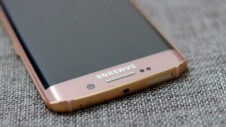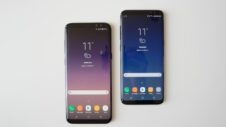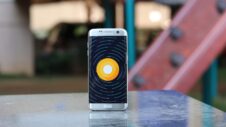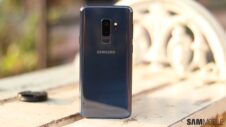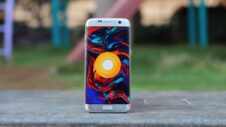“It’s Not a Phone, It’s a Galaxy” may have seemed to some to be nothing more than a commercial jab at Apple, but it has become a philosophy for Samsung: to make its Galaxy smartphones worlds (galaxies) of their own. And this strategy is paying off big-time for the Korean giant, with the latest Galaxy S7/S7 edge unveiling being yet another opportunity for Samsung to showcase its strengths and growth over the last 12 months. If you believed the Galaxy S6 and S6 edge were enticing worlds, then you’ll be pleased to know that their successors highlight their all-encompassing nature even more.
Samsung retained the glass and metal design of the Galaxy S6 and S6 edge, but the company waterproofed the Galaxy S7 and S7 edge “from the inside out” this time – taking these devices to better water resistance than their Galaxy S5 predecessor. The IP68 water and dust resistance means you can be confident that your devices will outlive the water (just make sure you read that new manual, though; it comes with some information on water and dust resistance that may save you trouble down the road).
The Galaxy S7 and S7 edge have better lowlight performance than their predecessors, meaning that photos in low light have never been as good as they’ll get with the f/1.7 camera apertures of both the front 5MP camera and the back 12MP Sony IMX260 camera. The Galaxy S7 and S7 edge now have Always On Displays that take advantage of our inherent need to “check our phones,” on average, about 150 times a day, and the Galaxy S7 edge now has quicker apps and content access so that you can spend time “swiping on the edge” and appreciating the aesthetic beauty of your smartphone while “living on the edge” for productivity.
The Galaxy S7 and S7 edge are worlds you’ll live in daily, whether at the office (checking your Always On Display or using the edge on the S7 edge), at the beach splashing the water and taking pictures (IP68 water and dust resistance, f/1.7 aperture cameras), at the grocery store or movie rental (Samsung Pay), on the road (microSD card slot for up to 200GB additional storage for movies, TV shows, and music), and so on. Like Visa, the Galaxy S7 and S7 edge can go “everywhere you wanna be.”
In contrast, though, the LG G5, also unveiled on Sunday, didn’t quite create the world Samsung’s Seoul rival wanted. Yes, it does feature what the Korean manufacturer calls a modular design (though I’d say it’s only semi-modular at best and fancy word-dressing at the worst), but LG wants to sell you on the G5 being modular “if” (this being the key word) you buy “Friends” to go with the G5, including the 1) Cam Plus, 2) Hi-Fi Plus, 3) LG 360 VR headset, 4) 360 Cam, 5) LG Rolling Bot, and others.
Along the same lines, the G5 is only a world (dare I say, Galaxy?) if and only if you buy these external devices and connect them via wire cables. As a friend of mine said to me this week, friends aren’t friends if you pay for them. “Life’s better with friends,” LG says, but how much better life is when you have to pay for them is debatable.
Whether or not your G5 is an entire world is dependent upon how much you’re willing to spend. When you haven’t sold your phone, worth $700 USD, as a Galaxy, you won’t do well to give people the world “if” they’ll spend additional funds. If the Galaxy S7 and S7 edge are worlds of their own, on their own, why would anyone spend more money to try to have a DIY “Galaxy” project, as the G5 presents to us? LG’s wireless headphones, and its G5, the latest smartphone out of step with landline phones, take a huge step back in innovation with the G5’s VR headset and “Friends” cables.
To have a successful product, manufacturers must sell customers on one single device as meeting their needs completely. The LG G5 will appeal to DIY folks who love taking things apart and putting them together, but most consumers lie in the opposite camp: they want a truly “smart” smartphone that is all-encompassing, right out of the box that requires as minimal a setup for enjoyment purposes as possible. If they get a smartphone that can do “a Galaxy” of things for them, then they’ll be happy to use it to construct their own Galaxy (which is why Samsung’s Gear VR is rising in popularity) and buy additional accessories to make it happen.
Sell consumers your phone as their world first, and then they’ll buy your accessories. LG has yet to sell its G2, G3, and G4 as “Galaxies” of their own (LG Pay for mobile payments may have helped in this regard); why would anyone want to DIY a world with the G5 when the person hasn’t figured out whether or not he or she even wants the G5 on its own merit? LG could’ve focused on the G5 alone, but its attempt to leap into an ecosystem with the G5 “Friends” shows that the company has not yet thought through its marketing strategy carefully.
The G5 is different for the sake of being different, but where will LG’s modular design go next year? I’m inclined to think that the modular G5 is a one-hit wonder that I can pass up. And when you’re going up against a name like Samsung, you have to make sure all, not some, of your ducks are lined up in a row.



